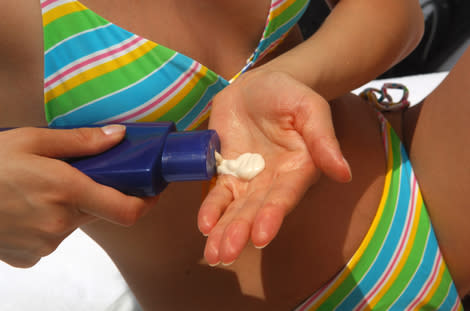Darker Skins Need Sun Protection, Too
We sat down with Miami-based dermatology specialist Dr. Francisco Flores and asked him to elaborate on effective sun protection for all shades of skin, especially during the summer.

An unhealthy myth
If you thought that just because you have an olive or darker skin tone you don't need as much sun protection as your more fair skin counterparts, you're wrong according to Dr. Flores.
"This is a common myth among Hispanics and other ethnic groups," says the dermatologist. "They think they have an inherent protection against the sun because of their darker skin tones. Latinos in this country also tend to believe that they don't get skin cancer, but their rate for this disease has gone up 300% during the last ten years."
VIDEO: Get a great tan without burning
Consequences of disregarding sun protection
Dr. Flores explained that the after-effects of inadequate sun protection can be seen both in the short term, as well as in the long run. "If you don't protect your skin from exposure to the sun, you will likely suffer from physical burns. Olive and darker skin tones usually develop manchas (brown spots) also known as hyper pigmentation," says the Flores of the immediate results. But the long term consequences to the lack of sun coverage can take a toll on the appearance of your skin, or even worse, be harmful to your health. "Most people forget that 90% of all wrinkles come from unprotected exposure to the UVA rays of the sun. But the long term lack of sun protection can lead to skin cancer," states the physician.
How to protect the skin effectively
According to Dr. Flores, here are not-to-be-missed steps to achieve the best skin protection against the sun:
Pick a facial sunscreen with a wide protection against the UVA and UVB rays of the sun, like Aveeno Positively Radiant Daily Moisturizer SPF 30. This is a non-comedogenic product, meaning that it won't produce pimples, whiteheads or blackheads. Plus, an SPF of 30 should be the minimum level of sun protection all skin types should have.
Re-apply every two hours, especially if you go outdoors during the day. For example, if you walk or go out for lunch at noon, make sure you apply your facial sunscreen again before going outside.
Most people do not apply enough sunscreen or miss key areas. Make sure you use enough product to not only cover your face and nose, but the top of your ears, the front and back of your neck and any other part not covered by clothing. If you are bald or have thinning hair, make sure to apply sunscreen to your head as well.
Keeping sun-healthy outdoors
Being outdoors is a great summer pleasure, but Dr. Flores emphasizes the need for practical sun protection. "If you're outdoors, make sure to wear a hat, long sleeves and stay under a big umbrella, besides applying sunblock with at least an SPF of 55, like Aveeno's Continuous Protection Sunblock Lotion with SPF 55. If you plan to bring your baby or child to the beach, make sure to keep them under an umbrella when they're resting, keep reapplying their sunscreen, and if at all possible, plan your beach outing before 10 am or after 4 pm."
And, did you know that driving a car is considered an outdoor activity? According to Dr. Flores, the sun's UVA rays penetrate right through your car's window and can create havoc on your skin. Even tinted glass may not offer the full UVA protection you may expect, so check with your tinted glass provider to make sure not only the interior of your car gets protected, but also the skin you live in stays healthy.
Dr. Francisco Flores is a Cuban-born doctor of dermatology practicing in Miami, Florida. He is a Diplomate of the American Board of Dermatology, conducts dermatological phase II and III clinical research trials, and is an expert in skin cancers.
